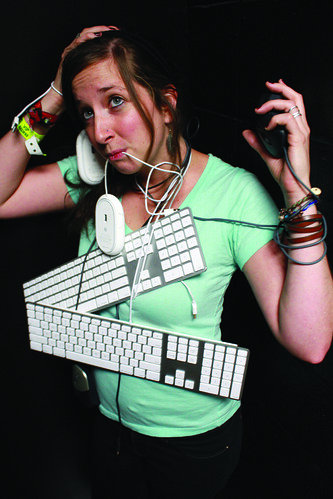With college students more plugged in than ever, psychologists debate whether it can be a vice.
It’s midterms week, and cramming for the big exam has lost its original luster. Productivity starts to wear off, and soon, opening the laptop to check the hottest hits on iTunes suddenly becomes an hour of Facebook creeping.

In a world where technological devices are being invented as quickly as one can type “textsfromlastnight.com,” some psychologists are classifying excessive Internet use as an addiction, and treatment centers are popping up to combat the at times vaguely defined illness.
Psychology professor Dr. David Margules said an Internet addiction is as valid as any other.
“Internet addiction is as real as any other addiction, such as a gambling addiction,” Margules said. “Like other addictions, it is compulsive, and the individual is powerless to stop it, even though it interferes with his work life and/or love life.”
Those people afflicted with an addiction develop a pattern of repetition because a “tolerance develops to the addicting activity, forcing the individual to raise his exposure,” Margules said.
He credits a person’s inability to rise above the habit to “a painful withdrawal syndrome, [which] occurs upon discontinuation of the addicting activity.”
Dr. Robin Risler, the coordinator of campus alcohol and substance awareness, defined addiction as “an umbrella term that may include pornography, Internet shopping, gaming, social networking, blogging or surfing the web.”
But, while Risler said she can verify the psychological symptoms of addiction that Margules described, she does not see overuse of the Internet as a full-on addiction.
“Any behavior that interferes with normal functioning, such as attending classes, completing assignments, studying, working or [maintaining] relationships is a legitimate problem,” Risler said. “But I’m not certain whether I would diagnose a person with having a specific disorder, or if I see the Internet as something with addictive qualities like a drug.”
The inconsistent ideas of Margules, Risler and psychologists around the globe, fuel the debate on whether excessive time spent on the Internet is a sound case for diagnosing an addiction.
“There is currently a debate as to whether to include Internet addiction as a diagnosis in the [fifth edition of the ‘Diagnostic and Statistical Manual of Mental Disorders’], which is expected to be published in May 2013,” Risler said.
But psychologists aren’t the only people to have their opinions on the plausibility of Internet addictions.
Music fanatic Dylan Peer, a sophomore psychology and journalism major, said his love of discovering new artists and songs – coupled with his use of Facebook and StumbleUpon – adds up to approximately five hours of media consumption per day in front of the computer screen.
Peer said he is infatuated with the Internet mainly because he is “addicted” to listening to new songs and artists.
“It serves as a break, it numbs the mind and you don’t even realize the time goes by,” he said.
Still, not every student voices the same opinion as Peer’s.
Nicole Lustig, a senior advertising major, does not label the Internet a necessity. Although she may grow weary-eyed from a whopping eight or nine hours of computer usage per day, this significant chunk of time is spent on AdFreak.com, which she is required to use at work.
“No, the Internet is not an addiction. I see how it is an escape, but since I live far from [Philadelphia], I only use it to connect with people from home,” Lustig said.
For some, the solution to all those wasted hours spent on the Web may lie in the comfort of their own four walls – more specifically, at the laptop that spurred their Internet addictions in the first place.
SaaviAccountability.com creator Justen Wack launched the website to tackle this hard-to-defy obsession because he once struggled with it. Wack said he and many of his friends immersed themselves in unhealthy amounts of online pornography, social networking sites and excessive online gaming.
To combat his bad habits, he tried filtering and blocking content but eventually manually un-did the settings, which motivated him to research how other technologies worked and to develop an alternative method.
“We specifically designed it to be completely customizable to each individual or family situation that uses it. With Saavi Accountability, the user gets to set the standards of how the software runs, not us as a company,” said Wack, who designed the software with help from addiction therapists.
“Individuals generally make the decision to use Saavi Accountability when they begin to recognize a detrimental behavior that is surfacing,” Wack added. “These are individuals who want the help of a trusted friend in keeping their online behaviors in check. The main thing is that they want the support and make the choice to install the software to help facilitate that.”
William Augustyn, a senior secondary English education major, said the temptation to surf the Web is caused by technology’s evolution.
“It started with the computer, which became a laptop, which has Wi-Fi. And if you look at our cell phones, specifically smartphones, they’re being programmed like computers, too,” Augustyn said. “It’s at our fingertips – we can’t get away from it.”
Andrea Cicio can be reached at andrea.cicio@temple.edu.



If you would like to learn more about Saavi Accountability go to our website… http://www.saaviaccountability.com.
Greg DiVilbiss
C.O.O.
Saavi